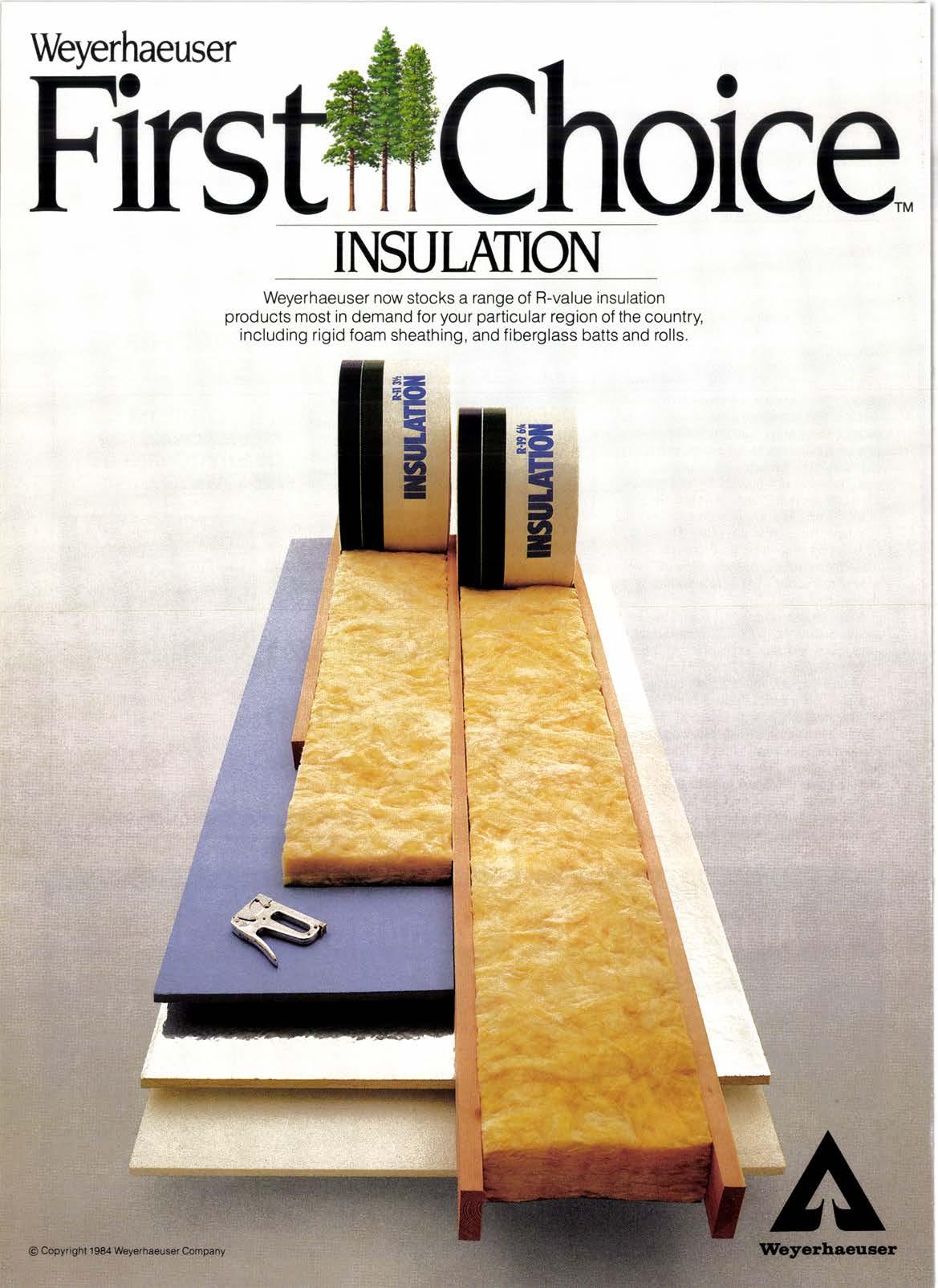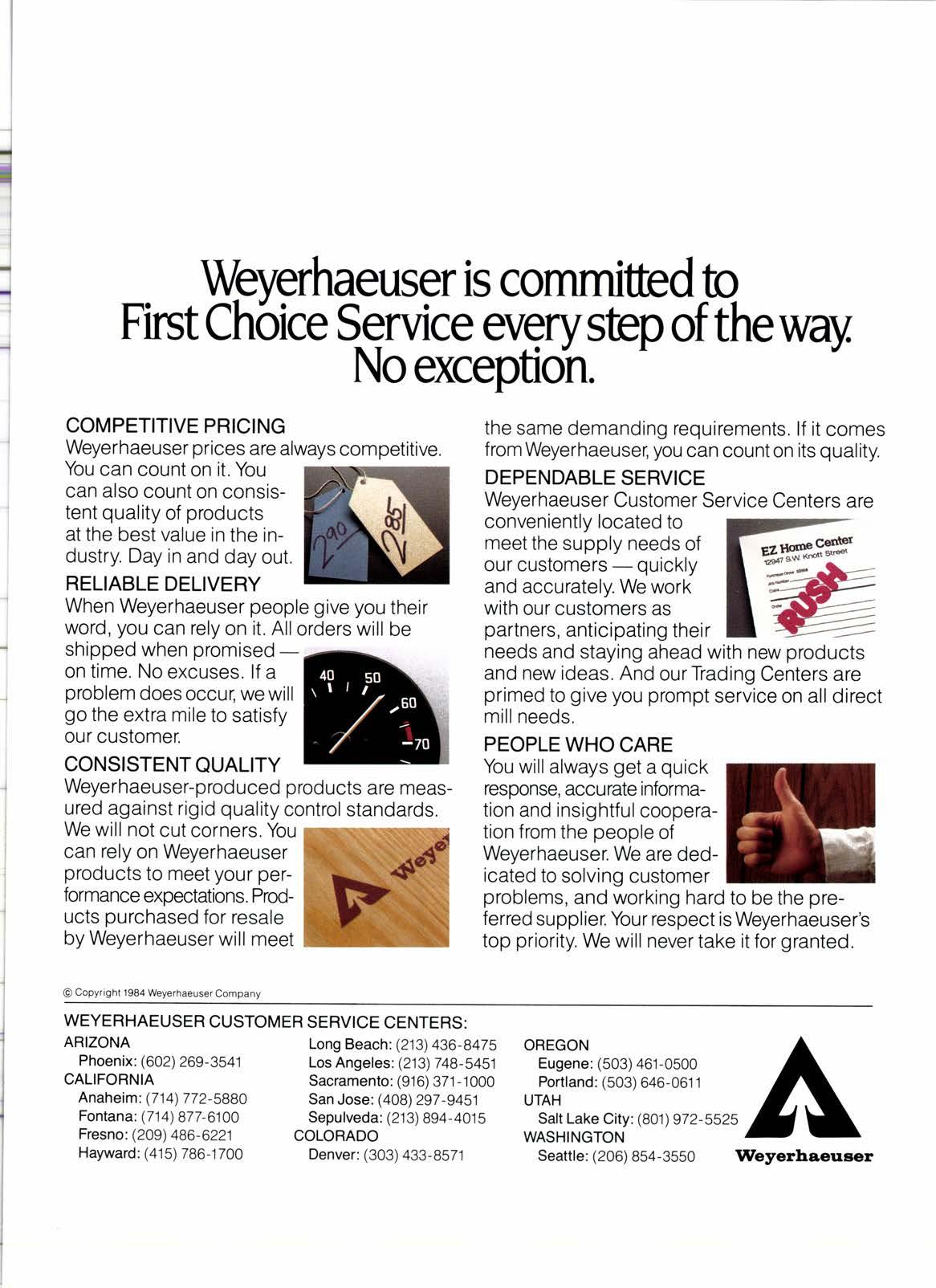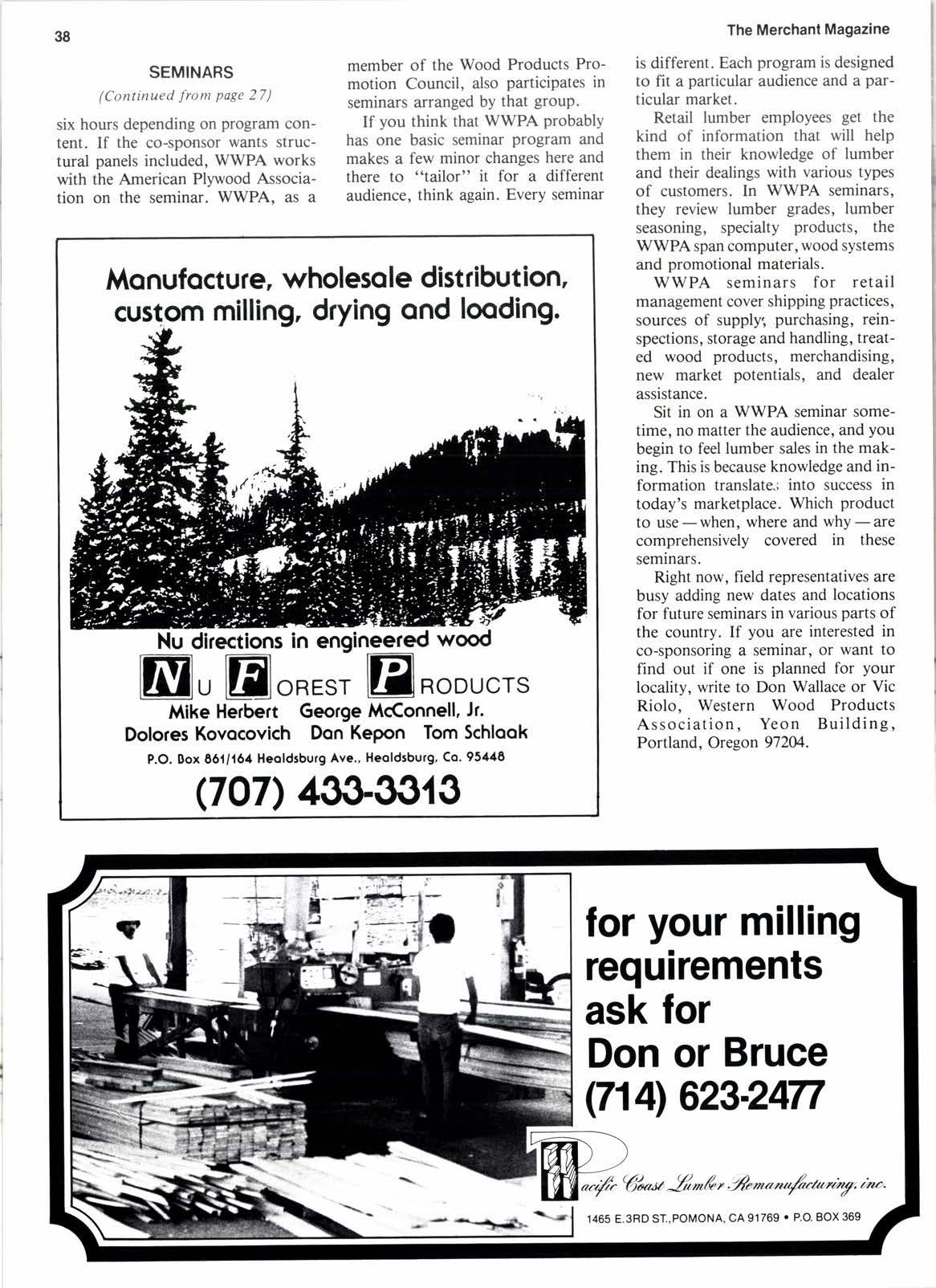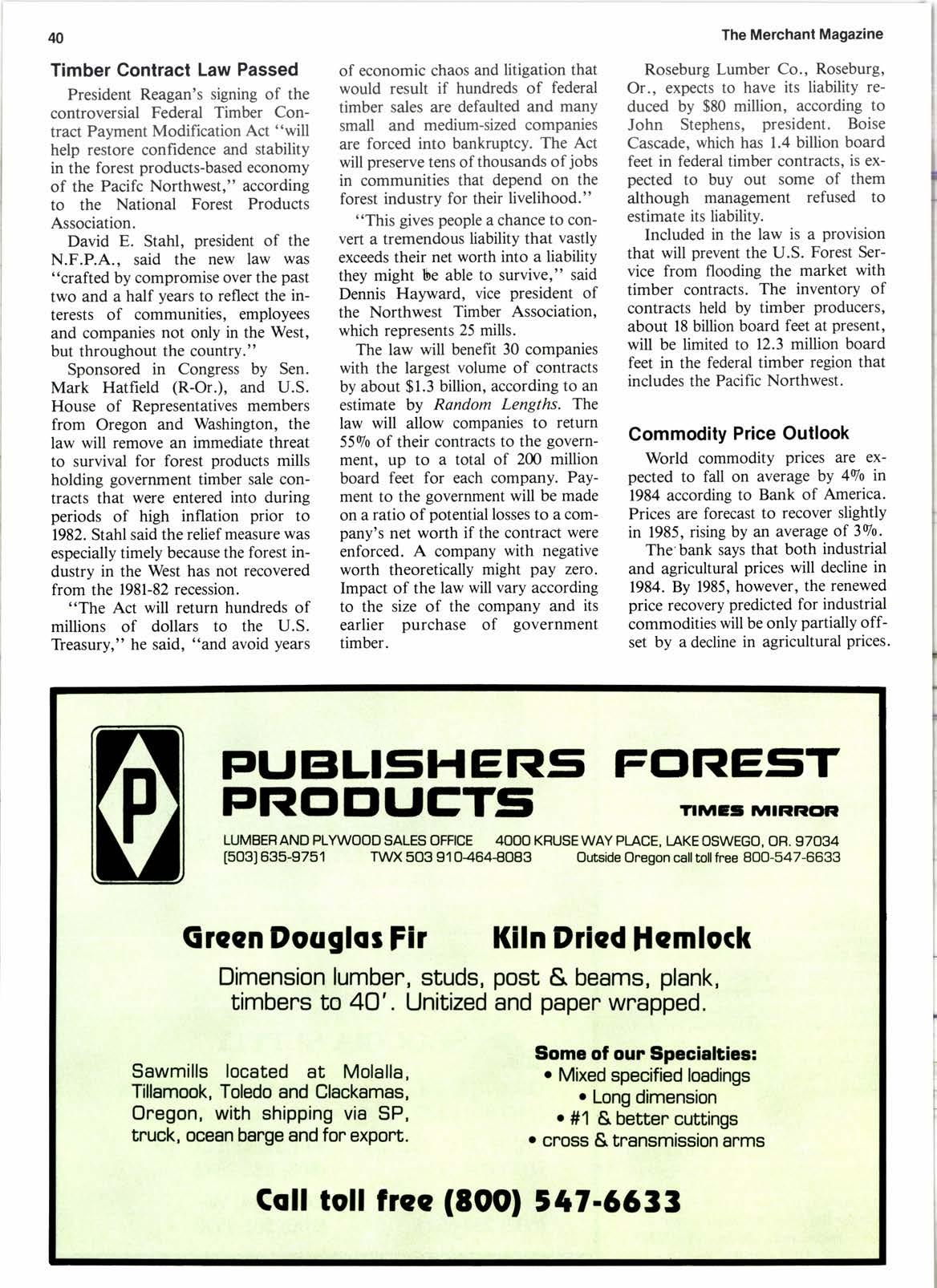
6 minute read
Fks Choice INSULATION
Weyerhaeuser now stocks a range of R-value insulatron products most in demand for you. oa.ticr,,lar regisn o'the country, rncluding rigid foam sheathing and f iberglass batts and rolls
Competitive Pricing
Weyerhaeuser prices are always competitive. You can count on it. You can also count on consistent quality of products at the best value in the industry. Day in and day out.
Reliable Delivery
When Weyerhaeuser people give you their word, you can rely on it. Allorders will be shipped when promisedon time. No excuses. lf a problem does occur; we will go the extra mile to satisfy our customer,
Consistent Quality
Weyerhaeuser-produced products are measured against rigid quality control standards, We will not cut corners. You can rely on Weyerhaeuser products to meet your performance expectations. Products purchased for resale by Weyerhaeuser will meet the same demanding requirements. lf it comes fromWeyerhaeuser, you can counton its quality.

Dependable Service
Weyerhaeuser Customer Service Centers are conveniently located to meet the supply needs of our customersquickly and accurately. We work with our customers as partners, anticipating their needs and staying ahead with new products and new ideas. And our Trading Centers are primed to give you prompt service on all direct mill needs.
People Who Care
You willalways get a quick response, accu rate information and insightful cooperation from the people of Weyerhaeuser. We are dedicated to solving customer problems, and working hard to be the preferred supplier Your respect isWeyerhaeusers top priority. We will never take it for granted.
WEYERHAEUSER CUSTOMER SERVICE CENTERS:
ARIZONA
Phoenix: (602) 269-3541
CALIFORNIA
Anaheim : (7 1 4) 77 2- 5880
Fontana: (7 1 4) 87 7- 61 0O
Fresno: (2Og)486-6221
Hayward: (415) 786-1 700
Long Beach: (213) 436-8475
Los Angeles: (213) 748 - 5451
Sacramento: (916) 371 -1000
San Jose: (408) 297-9451
Sepulveda: (213) 894-401 5
COLORADO
Denver: (303) 433-8571
OREGON
Eugene: (503) 461-0500
Portland: (503) 646-061 1
UTAH
Salt Lake City: (801) 972-5525
WASHINGTON
Seattle: (206) 854-3550
V9eyerha'euser
Seminars
(Continued from Page 27) six hours depending on program content. If the co-sponsor wants structural panels included, WWPA works with the American Plywood Association on the seminar. WWPA. as a member of the Wood Products Promotion Council, also participates in seminars arranged by that group'
If you think that WWPA probably has one basic seminar program and makes a few minor changes here and there to "tailor" ii for a different audience, think again. Every seminar is different. Each program is designed to fit a particular audience and a particular market.
Retail lumber employees get the kind of information that will help them in their knowledge of lumber and their dealings with various types of customers. In WWPA seminars. they review lumber grades, lumber seasoning, specialty products, the WWPA span computer, wood systems and promotional materials.
WWPA seminars for retail management cover shipping practices, sources of supplyi purchasing, reinspections, storage and handling, treated wood products, merchandising, new market potentials, and dealer assistance.
Sit in on a WWPA seminar sometime, no matter the audience, and you begin to feel lumber sales in the making. This is because knowledge and information translate.; into success in today's marketplace. Which product to use-when, where and why-are comprehensively covered in these seminars.
Right now, field representatives are busy adding new dates and locations for future seminars in various parts of the country. If you are interested in co-sponsoring a seminar, or want to find out if one is planned for your locality, write to Don Wallace or Vic Riolo, Western Wood Products Association, Yeon Building, Portland, Oregon 972M.

G-P to Focus On the Forest
In line with a strategy of focusing on core forest products businesses, Georgia-Pacific Corp. will sell certain of its commodity chemical operations to a group of executives currently managing that business. Negotiations were expected to reach a definitive agreement this month.
The company also announced that it is continuing to evaluate bids with respect to its previously announced decision to sell Exchange Oil & Gas, the company's oil and gas subsidiary.
"These sales are in line with our strategy of focusing on our core forest products businesses," T.
Marshall
Hahn Jr., chairman and chief executive officer of Georgia-Pacific, said. "They will raise a substantial amount of cash, further strengthening Georgia-Pacific's financial position and our ability to take advantage of investment opportunities offering superior results for our shareholders."
It is anticipated that these transactions will, when aggregated, result in a loss on sale and will likely also result in the chemical segment being treated as a discontinued operation.
In July, G-P announced that it would retain its thermosetting resin lines, as well as specialty chemicals closely related to its core forest products business. The company is continuing the evaluation of its color concentrate plant at Farmingdale, N.Y., an expandable polystyrene plant at Painesville, Oh., and its chlorine and caustic soda operation at Bellingham, Wa.
Wally Lynch
(Continuetl from page 31)
It is common, in many areas, to charge for the hand placement of sheet rock. the most used approach is in the $8 to $10 range per 1,000 square feet. This will change all ofthe above numbers, ifnot to profit, at least to a minimized loss. The boom trucks offer the potential for profitable sheet rock delivered sales and from this standpoint, the equipment can, under certain conditions. be effective. Easv. it never will be!
"Management Surveys the Black Hole of Delivery, " divided inro three separate dollar volume manuals, under $2 million, $2-5 million and over $5 million, is available for $45 from Builders Express Inc., 11550 Plano Rd., Dallas, Tx. 75243, Attention: Wolly Lynch.

Timber Contract Law Passed
President Reagan's signing of the controversial Federal Timber Contract Payment Modification Act "will help restore confidence and stability in the forest products-based economy of the Pacifc Northwest," according to the National Forest Products Association.
David E. Stahl, president of the N.F.P.A., said the new law was "crafted by compromise over the past two and a half years to reflect the interests of communities, employees and companies not only in the West, but throughout the country."
Sponsored in Congress by Sen. Mark Hatfield (R-Or.), and U.S. House of Representatives members from Oregon and Washington, the law will remove an immediate threat to survival for forest products mills holding government timber sale contracts that were entered into during periods of high inflation prior to 1982. Stahl said the relief measure was especially timely because the forest industry in the West has not recovered from the l98l-82 recession.

"The Act will return hundreds of millions of dollars to the U.S. Tieasury," he said, "and avoid years of economic chaos and litigation that would result if hundreds of federal timber sales are defaulted and many small and medium-sized companies are forced into bankruptcy. The Act will preserve tens of thousands of jobs in communities that depend on the forest industry for their livelihood."
"This gives people a chance to convert a tremendous liability that vastly exceeds their net worth into a liability they might be able to survive," said Dennis Hayward, vice president of the Northwest Timber Association, which represents 25 mills.
The law will benefit 30 companies with the largest volume of contracts by about $1.3 billion, according to an estimate by Random Lengths. The law will allow companies to return 5590 of their contracts to the government, up to a total of 200 million board feet for each company. Payment to the government will be made on a ratio of potential losses to a company's net worth if the contract were enforced. A company with negative worth theoretically might pay zero. Impact of the law will vary according to the size of the company and its earlier purchase of government timber.
Roseburg Lumber Co., Roseburg, Or., expects to have its liability reduced by $80 million, according to John Stephens, president. Boise Cascade, which has 1.4 billion board feet in federal timber contracts, is expected to buy out some of them although management refused to estimate its liability.
Included in the law is a provision that will prevent the U.S. Forest Service from flooding the market with timber contracts. The inventory of contracts held by timber producers, about l8 billion board feet at present, will be limited to 12.3 million board feet in the federal timber region that includes the Pacific Northwest.
Commodity Price Outlook
World commodity prices are expected to fall on average by 490 in 1984 according to Bank of America. Prices are forecast to recover slightly in 1985, rising by an average of 390. The'bank says that both industrial and agricultural prices will decline in 1984. By 1985, however, the renewed price recovery predicted for industrial commodities will be only partially offset by a decline in agricultural prices.









